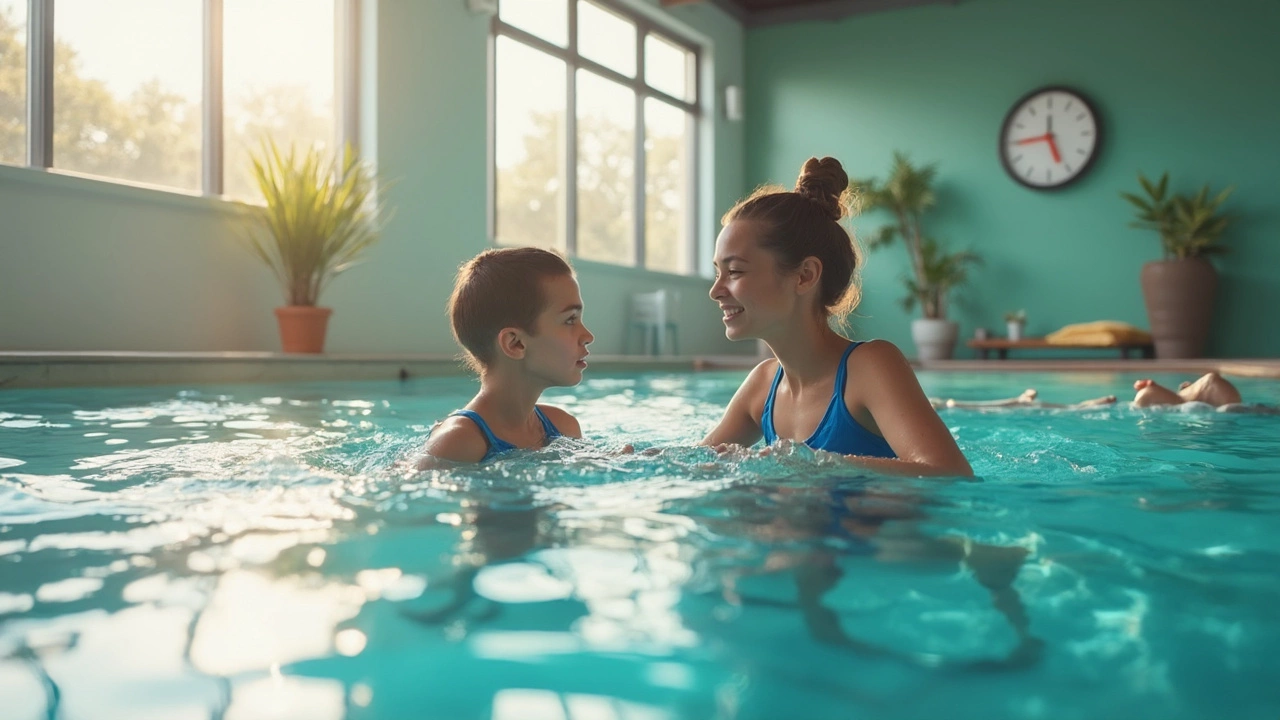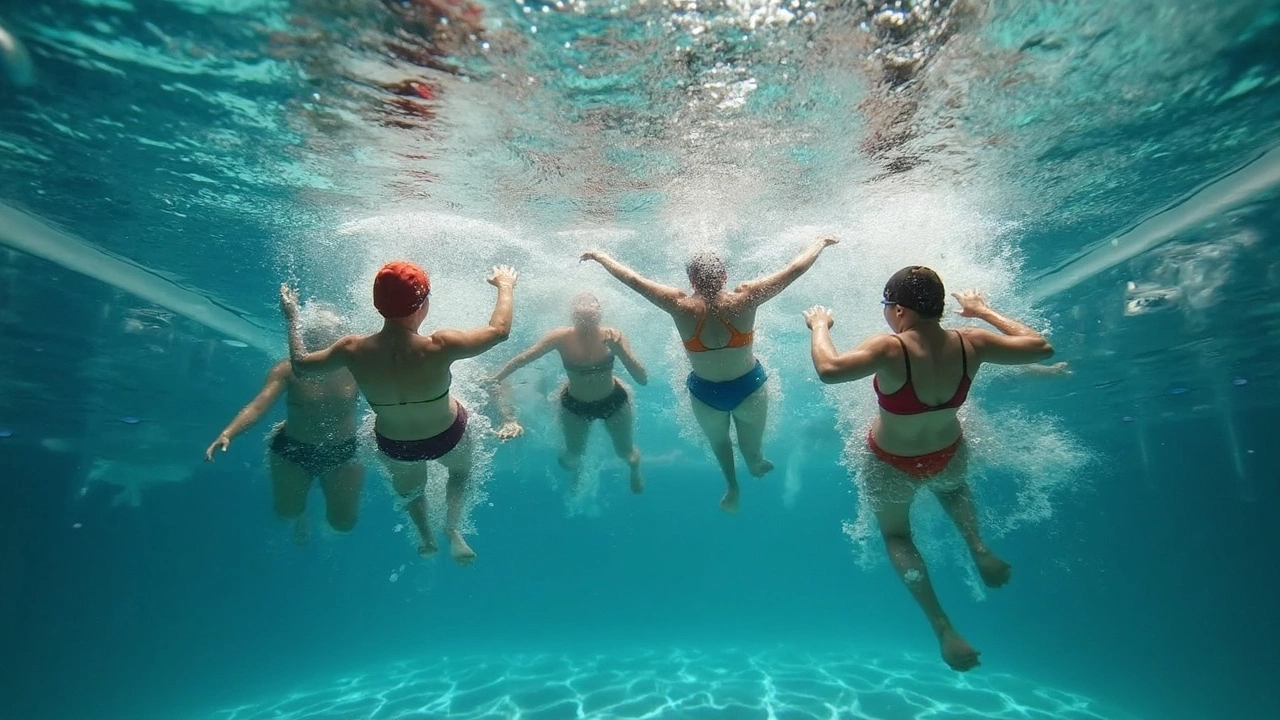How Often Should a Beginner Swim: A Practical Guide
 Feb, 18 2025
Feb, 18 2025
So, you're ready to jump into the world of swimming? Perfect choice! But before you dive head-first, there's a crucial question to answer: how often should you actually be swimming as a beginner? Many new swimmers puzzle over this, hoping to find the sweet spot that balances progress with the fun of learning something new.
The golden rule? Aim for about two to three sessions per week. This frequency offers enough practice to make progress without overwhelming yourself. Consistency is key, and a few sessions a week provide just that without feeling like a chore.
Building a routine can be your best friend here. Try penciling in specific times in your weekly schedule for swimming, making it a regular part of your life, just like grabbing morning coffee or watching your favorite TV show.
Frequency of Swimming Sessions
For beginner swimming, figuring out how often to get in the water can feel like a tough puzzle. You want to make progress but not burn out or, worse, risk injury. So what's the ideal frequency?
Most experts suggest aiming for two to three times a week. Why? Because this range gives your muscles time to recover while keeping your momentum going. You've got that balance between rest and work. Your body gets used to the routine, allowing you to build skills effectively without feeling overwhelmed.
Now, you might be thinking, "But what if I'm super pumped and want more?" It's normal to be eager, but remember, swimming works your entire body. Doing more without adequate rest can lead to fatigue or muscle soreness, which could slow you down in the long run.
Why Frequency Matters
Swimming frequently helps reinforce muscle memory. Every time you practice a stroke, your body remembers it a little better, making each session smoother and more effective. Plus, the regular exercise is great for improving your overall fitness and endurance.
For our ambitious swimmers, consider the physical benefits. Did you know swimming just a couple of times a week can improve cardiovascular health and help with weight management?
Adjusting Frequency
If you feel particularly tired after a swim, it might be a sign to tone it down a bit. Everyone's different, so listen to your body. As you build endurance, gradually increasing sessions might be beneficial. And remember, rest days are part of the training too.
In the end, consistency is more important than intensity. Stick with those two to three sessions a week, and you'll likely find the right rhythm to enjoy and progress in your swimming journey.
Building a Routine
Getting into a swimming routine is less about strict schedules and more about finding a rhythm that works for you. As a beginner swimming, your main goal is to create habits that keep you returning to the pool, rain or shine.
Start Small and Scale Up
Beginners may feel tempted to jump in five times a week, but bit by bit is the way to go. Begin with two to three sessions per week, giving your body time to adjust and recover. Trust me, your muscles will thank you.
Keep track of your sessions, maybe jot them down in a swimming diary or app. That way, you can clearly see your progress, which is a huge motivator.
Plan Around Your Lifestyle
Everyone has a different schedule, either due to work, family, or other commitments. Ensure swimming doesn't become a hassle by fitting it into your existing life. Morning swims work wonders for some, while others prefer evening dips to unwind after a busy day.
Less is sometimes more. Don't squeeze in a session if you're low on energy or sleep-deprived. Always prioritize quality over quantity when it comes to practice.
Stay Flexible
Even the best-laid plans can go awry. Life happens, but the key is to not stress or feel guilty about missed sessions. Swimming is supposed to be enjoyable, so keep it light-hearted.
Give Yourself Time to Rest
Believe it or not, rest is as important as the swim itself. Your muscles build strength during rest periods, not while you're training. Scheduled days off are essential, especially when you're just starting.
Here's a quick look at a starter plan:
| Day | Activity |
|---|---|
| Monday | Swim Session |
| Wednesday | Rest or Light Exercise |
| Friday | Swim Session |
| Sunday | Optional Swim or Relax |
Mix in some cross-training, like biking or yoga, to improve your overall fitness without overworking your swimming muscles.

Listening to Your Body
Diving into swimming as a beginner is an exciting journey, but don't forget that your body has its own way of talking back. Listening to what it's saying can make a huge difference in how effective and enjoyable your swimming practice becomes.
Recognize Signs of Fatigue
When you start out, you might feel like a superstar, ready to swim laps around Michael Phelps. But if you're starting to feel too tired or a bit dizzy, take that as a hint from your body to slow down. Your muscles need time to recover, so take breaks between laps or sessions to avoid burnout. It's all about finding the right balance.
The Importance of Rest Days
It's tempting to swim every day when you're eager to improve, but rest days play a crucial role. Rest allows your muscles to repair and get stronger. Think of it like charging your phone; if you don't let the battery refill, it's going to run out. For beginner swimming, aim for one or two rest days a week.
Pay Attention to Pain
Pain is not the same as normal muscle soreness. If something hurts, it could be a sign of an injury or incorrect technique. For instance, shoulder pain is a common issue among swimmers, often due to overuse or improper form. In such cases, consider talking to a coach or a physical therapist to address the issue before it gets worse.
| Sign | Action |
|---|---|
| Fatigue | Rest or reduce swimming time |
| Pain | Consult a professional |
| Soreness | Stretch and hydrate |
The bottom line is, be kind to your body. Listening to its signals can enhance your swim lessons experience and prevent setbacks. Remember, it's a marathon, not a sprint!
Tips for Beginners
Starting your swimming journey is exciting, but a little guidance never hurts. Here are some practical tips to help you make the most out of your beginner swimming sessions.
Start Slow and Steady
The temptation to push hard every session is real. But it's crucial to pace yourself as a beginner. Begin with shorter swim times and gradually build up as your stamina improves. Remember, it's okay not to feel exhausted after every session.
Focus on Technique
Good techniques lay the foundation for becoming a strong swimmer. Pay attention to your body's alignment in the water, breathing patterns, and stroke forms. Getting these fundamentals right from the start helps avoid bad habits down the road.
Use Swim Aids
Don't shy away from using swim tools. Kickboards, pull buoys, and fins can assist you in focusing on specific aspects of your swim strokes. They're like training wheels, and there's no shame in using them while you learn.
Stay Consistent
Practice consistently to see improvement. As mentioned before, aim for two to three swim lessons a week. Consistency builds muscle memory, leading to better skills over time.
Measure Your Progress
Keep track of your progress to stay motivated. Mark your achievements, no matter how small. Over time, you'll notice improvements in endurance, speed, and overall comfort in the water.
Hydration and Nutrition
Swimming is physically demanding, so keep well-hydrated and fueled. Drink water as needed. Eating a balanced diet helps in energy levels for optimal performance.
Pool Etiquette
Don't forget about pool manners. Be mindful of lane rules, such as swimming on the right side or letting faster swimmers pass. This creates a better experience for everyone.
Consider Lessons
If you feel like you're hitting a wall or want to accelerate learning, consider taking formal swim lessons. Structured guidance from a coach can provide valuable feedback and introduce new techniques.